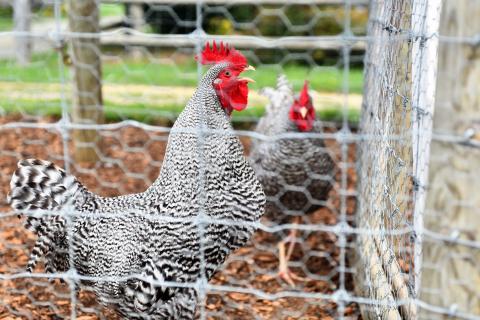What are the best ways to protect my chickens from predators?

Running into conflicts with wildlife is an inevitable aspect of keeping backyard chickens. Almost every predatory species will eat chicken if given the opportunity. Chickens that are securely housed within their coop at all times are rarely at risk, but most backyard flock owners find this unacceptable. If you decide to keep free range chickens, you must accept that they are far more vulnerable to predation. Your flock is reliant on you to provide housing and safety. By taking appropriate measures to protect your birds, you can minimize your losses.
Identifying the Predator
The list of predators that attack poultry is long, and predation can occur at both day and night. If something is attacking your chickens, the first thing you need to do is figure out which predator is to blame. In many cases, predators will leave tracks or scat behind as evidence. When those signs are absent, much can be inferred by the way in which the chickens are attacked. Different predators are active at different times of the day and their hunting and feeding behaviors vary. Once you know which predator is causing issues for your flock, you can take action to prevent future issues.
Foxes, coyotes, and bobcats do much of their hunting after dark and usually haul chickens away to eat elsewhere. Raccoons and weasels are also significant overnight threats. Raccoons will often pull a chicken’s head or legs through a wire fence and leave its body behind, while weasels sometimes kill multiple birds by biting them at the backs of their heads. Raptors can also be a concern. Larger hawks will attack chickens from above during daylight hours and eat them in place, as evidenced by scattered feathers in the area. Great horned owls are known to take chickens at night, either carrying them away or eating them on the spot. Domesticated dogs and cats can be a problem in urban areas if they are allowed to roam free. Black bears will occasionally recognize chickens as food, and skunks and opossums will eat eggs and sometimes chickens too.
Preventing Predation
Good predator management starts with quality fencing. Fences not only keep predators out, but also keep chickens from becoming a nuisance on the neighbor’s property. If using wire mesh to build an enclosure, make sure that the openings are smaller than one inch to prevent predators from reaching through. Electric poultry fencing is an even better option to protect against ground predators. When avian predators are a problem, covering the chicken run with wire or mesh can be effective. Burying mesh at least one foot deep around the sides of the enclosure will keep predators from digging.
Keeping chickens indoors at night is easily the most important and effective way of protecting free range birds, because many predators are most active between dusk and dawn. Chickens can be trained to go inside a coop in the evening by feeding and watering them inside at dusk. Once the birds are inside, close and securely fasten all of the doors until the following morning. Solid sided coops are best because they prevent predators from reaching inside. Make sure to seal up all small holes which might allow weasels or rats to gain access.
Carefully selecting a good site for the chicken coop and maintaining the surrounding area are essential. When possible, try to place the coop and enclosure in a place where there aren’t any nearby trees or other places for hawks and owls to perch. It’s also a good practice to keep the surrounding area clear of debris, brush, and tall grass, as these features will give predators a place to hide and sneak up on their prey.
Finally, don’t compound problems by inadvertently attracting or feeding predators. Only give chickens what they consume in a typical feeding, and clean up excess frequently. All chicken feed should be stored in air-tight, odor-free containers, and spills should be promptly addressed. Open compost piles should be kept as far away from the chicken coop as possible, and garbage should be held in secure bins.
Wildlife Management
If you’ve done everything you can to exclude a nuisance animal from attacking your chickens and are considering predator control measures such as trapping, killing, or relocating the animal, you should get in touch with USDA Wildlife Services at (603) 223-6832. Be aware that some predator species such as hawks and owls are federally protected and it is illegal to kill them.

When raising chickens, there is always a high risk of predation. If given an opportunity, a wide variety of predators will make a meal out of backyard flocks. However, if you make an effort to provide adequate housing and fencing and train your birds to return to the coop at night where they can be secured, you are well on your way to keeping your chickens happy and healthy.
Got questions? The Ask UNH Extension Infoline offers practical help finding answers for your home, yard, and garden questions. Call toll free at 1-877-398-4769, Monday to Friday, 9 a.m. to 2 p.m., or e-mail us at answers@unh.edu.
Related Resource(s)
Do you love learning about stuff like this?
SUBSCRIBE TO Granite State Gardening newsletter
Got questions? The UNH Extension Yard and Garden Infoline offers practical help finding answers for your yard and garden questions.
Call toll free at 1-877-398-4769, Monday to Friday, 9 a.m. to 2 p.m., or fill out webform.
